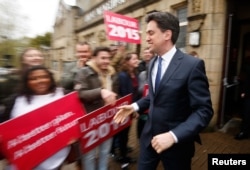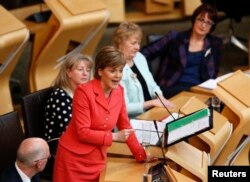British Prime Minister David Cameron and opposition leader Ed Miliband are making final appeals to voters ahead of the parliamentary election Thursday that surveys show is too close to predict.
The two main parties, Conservative and Labor, are expected to win only about one-third of the seats each.
According to opinion polls, the past five years of relative austerity but also strong growth more recently, followed by a bitter election campaign, have left the ruling Conservative/Liberal Democrat coalition led by Prime Minister David Cameron well short of a majority.
The Conservative Party is expected to be down about 20 seats from the last election in 2010. It could still have the largest number of any party, but experts say it will struggle to find enough coalition partners to form a government.
Its current partner, the Liberal Democrats, is projected to lose 38 seats, after supporting Conservative policies that many of its constituents oppose.
Labor is expected to pick up about 15 seats, winning about 270, still far short of a majority in the 650-member parliament.
Labor’s gains will be partly fueled by the anti-immigration, anti-European Union UK Independence Party drawing voters from the Conservatives in many constituencies. UKIP is only expected to win about two seats, the same number it has now, but it could cost the Conservatives a dozen or more.
A 'referendum' on the economy
Prime Minister Cameron, Britain's leader since 2010, and Miliband have both cast the election as a referendum on the country's economy, the world's fifth largest.
''People really want to think carefully before casting their vote," Cameron said at a campaign stop at a farm, "but I believe when the crunch comes, when they ask themselves the question: Do I trust Ed Miliband with the economy or do I want to stick with a plan and a team that's turning the country round? I think we can do very well on Thursday and cross that line."
Miliband has attempted to characterize Cameron's Tories as the party of the wealthy.
"This is the clearest choice that has been put before the British people for a generation," Miliband said, "between a Tory government that works only for the privileged few or a Labor government that will put working families first."
A possible power broker
Cameron has promised, if re-elected, to hold a referendum on whether Britain should stay in the 28-nation European Union. The question of Scottish independence from the United Kingdom remains as a key issue. Scottish nationalists lost a plebiscite last year, but could emerge with the third biggest bloc of seats in Thursday's voting.
The Scottish National Party, or SNP, has made significant gains against Labor in Scotland and could be the key power broker. It currently has just six seats, but is projected to win as many as 55.
Its leader, Nicola Sturgeon, has said she will do everything she can to prevent the formation of another Conservative-led government. That suggests to many experts that she could join a coalition led by Labor’s Ed Miliband.
“It looks slightly easier for the Labor Party to form a minority government than the Conservatives,” professor Tony Travers of the London School of Economics told VOA affiliate Al Hurra television, adding, “There are more parties that would be prepared to work them.”
Sturgeon, however, is expected to drive a hard bargain, possibly making policy demands Miliband cannot meet. And, it could be politically costly for Miliband to govern with the SNP, whose main policy goal is independence for Scotland.
Scottish voters rejected independence in a referendum last year, but the SNP wants to raise the issue again in the future.
Sturgeon’s party may end up supporting a minority Labor government without joining it, a situation analysts say would be fractious and unstable, and could result in a new election in a matter of months.
Political expert and former government official Kate Jenkins told Al Hurra she expects “a fairly straightforward coalition.”
“We’ll probably see that put together in a week or so,” Jenkins said, but did not say exactly what she thinks the coalition will be.






